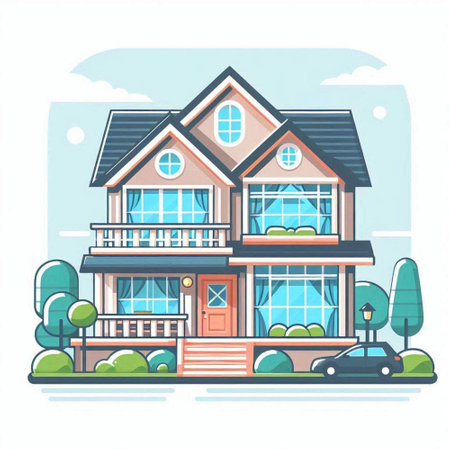1. The American Dream: Homeownership and Wealth Building
For generations, owning a home has been at the heart of the American Dream. Many people in the United States see buying a house not just as a place to live, but as a sign of personal achievement and stability. In movies, TV shows, and everyday conversations, having your own home is often linked with “making it” in life.
Cultural Significance of Owning a Home
Homeownership is more than just having a roof over your head—it’s about building roots in a community and creating a sense of belonging. For many families, buying a home is seen as an important milestone, almost like a rite of passage into adulthood or financial independence. It’s also viewed as something you can pass down to future generations, giving your children a better start in life.
Perceived Benefits for Building Wealth
Many Americans believe that owning a home helps build personal wealth over time. Here are some reasons why:
| Benefit | Description |
|---|---|
| Equity Growth | As you pay off your mortgage, you own more of your home, which can increase your net worth. |
| Appreciation | Homes often increase in value over time, so you may be able to sell for more than you paid. |
| Stability | Monthly payments can be more predictable if you have a fixed-rate mortgage, compared to rising rents. |
| Pride of Ownership | You can personalize your space and make long-term plans without worrying about landlord restrictions. |
| Tax Benefits | Some homeowners qualify for tax deductions on mortgage interest and property taxes. |
The Symbolism of Success
In American culture, owning your own home often means youve reached an important level of success. Its seen as proof that you’ve worked hard and achieved something meaningful. While renting offers flexibility, buying a home is still considered by many to be the ultimate goal for building lasting wealth and stability.
2. Breaking Down the Costs: Renting vs. Buying
When it comes to building wealth in America, one of the biggest decisions you’ll face is whether to rent or buy a home. To help you make an informed choice, let’s break down the real costs involved with each option. We’ll look at both the upfront expenses and what you’ll pay over time.
Upfront Costs
| Buying a Home | Renting | |
|---|---|---|
| Down Payment | Usually 3%–20% of home price (can be tens of thousands of dollars) | First month’s rent + security deposit (typically 1-2 months’ rent) |
| Closing Costs | About 2%–5% of purchase price (covers fees, inspections, etc.) | Application fee (often under $100), sometimes no additional fees |
| Moving Expenses | Varies by distance and amount moved | Varies by distance and amount moved |
Ongoing Monthly Payments
| Buying a Home | Renting | |
|---|---|---|
| Mortgage Payment | Main monthly expense; includes principal & interest; can be fixed or adjustable rate | N/A |
| Rent Payment | N/A | Main monthly expense; may increase with lease renewal |
| Property Taxes | Yes – varies by location, often paid through mortgage escrow | No – landlord pays this |
| Homeowners/Renters Insurance | Required for most mortgages; cost depends on home value and location | Optional, but recommended; usually cheaper than homeowners insurance |
| HOA Fees (if applicable) | If your home is in a community with an HOA, monthly or annual dues apply | No – landlord pays this if required |
| Maintenance & Repairs | Your responsibility; varies year-to-year, can be costly for major repairs | Usually covered by landlord for standard wear and tear |
| Utilities (water, gas, electric) | You pay all or most utilities | You may pay some or all utilities depending on lease agreement |
The Hidden and Long-Term Costs to Consider
- Equity Building: When you buy, part of your mortgage payment goes toward owning more of your home each month. With renting, your money doesn’t build equity—it goes to your landlord.
- Market Fluctuations: Home values can go up or down, affecting the worth of your investment.
- Rent Increases: Rent may rise over time due to inflation or market demand, while a fixed-rate mortgage stays the same.
- Selling Costs: If you sell your home later, expect to pay about 6% in realtor commissions plus closing costs.
- Lifestyle Flexibility: Renting makes it easier to move without the hassle of selling a house.
- Tangible Maintenance: Homeowners are responsible for all upkeep—from mowing lawns to replacing roofs—while renters rely on landlords for repairs.
A Quick Comparison Snapshot:
| Buying a Home 🏡 | Renting 🏠 | |
|---|---|---|
| Initial Cost High/Low? | High (down payment & closing costs) | Low (deposit & first month’s rent) |
| Monthly Payment Predictability? | Usually stable (fixed-rate mortgage) | Can change when renewing lease |
| Maintenance Responsibility? | Homeowner pays & manages everything | Landlord handles standard repairs |
| Potential for Wealth-Building? | Yes (home equity and appreciation) | No (no equity built) |
| Flexibility to Move? | Less flexible (need to sell or rent out home) | More flexible (just end your lease) |
This breakdown gives you a clearer idea of where your money goes when renting versus buying in America—and which path might fit your current financial situation and long-term goals best.

3. Equity, Appreciation, and Hidden Expenses
Building Equity: Your Stake in the Home
One of the biggest advantages of buying a home in America is building equity. Equity is the portion of your home that you truly own—the value of the home minus what you owe on your mortgage. As you make monthly payments, your equity grows over time. Think of it as a forced savings account that builds up each month instead of going to a landlord.
How Equity Grows Over Time
| Year | Monthly Mortgage Payment | Principal Paid (Equity) | Interest Paid |
|---|---|---|---|
| Year 1 | $1,500 | $300 | $1,200 |
| Year 10 | $1,500 | $700 | $800 |
| Year 20 | $1,500 | $1,100 | $400 |
This table shows how more of your payment goes toward building equity over time as you pay down your loan.
The Potential for Property Appreciation
Another way homeowners can build wealth is through appreciation—the increase in your homes value over the years. If you buy a house for $300,000 and its value rises to $350,000 after five years, thats $50,000 in potential profit if you sell. Of course, home values can also go down during tough economic times, so there are no guarantees.
Homeownership vs Renting: Wealth Building Comparison
| Buying a Home | Renting a Home | |
|---|---|---|
| Builds Equity? | Yes—grows with every mortgage payment and appreciation. | No—all payments go to landlord. |
| Potential for Appreciation? | Yes—may profit from rising property values. | No—no ownership stake. |
| Monthly Costs Predictable? | Generally yes (with fixed-rate mortgages), but can rise with taxes or insurance. | No—rent may increase each year. |
| Responsible for Repairs? | Yes—homeowner pays for all maintenance and repairs. | No—landlord usually covers repairs. |
The Not-So-Obvious Costs of Homeownership
While building equity and benefiting from appreciation sound great, owning a home comes with hidden expenses. Homeowners are responsible for property taxes, homeowner’s insurance, maintenance, and unexpected repairs like fixing a leaky roof or replacing an old furnace. These costs can add up quickly and should be included in your budget when considering buying versus renting.
Common Hidden Expenses for Homeowners:
- Property Taxes: Vary by location and often increase over time.
- Homeowner’s Insurance: Required by most lenders; rates depend on location and coverage.
- Repairs & Maintenance: From lawn care to plumbing issues—these are all on you.
- HOA Fees: Some communities charge monthly or annual fees for shared amenities or services.
If youre not prepared for these extra costs, they can take a big bite out of your budget and reduce some of the financial benefits that come with owning a home.
4. Flexibility and Mobility: The Case for Renting
For many Americans, especially young professionals, entrepreneurs, or anyone working in industries that are always evolving, flexibility and mobility are essential. Renting a home offers unique advantages for people who want to keep their options open and avoid long-term commitments.
Why Flexibility Matters
The American job market has changed dramatically over the years. Today, it’s common for people to switch jobs, move cities, or even change careers several times. If your career might take you from New York to Austin or from Seattle to Miami, renting makes moving much easier and less stressful.
Key Benefits of Renting
| Benefit | Description |
|---|---|
| No Long-Term Commitment | You can usually sign a lease for just 12 months (or even less), so you’re not tied down if life changes. |
| Easier Relocation | If you get a new job offer in another city or state, you can move once your lease ends—no need to sell a house. |
| Lower Upfront Costs | You only need to pay a security deposit and maybe first/last month’s rent—no huge down payment required. |
| Less Responsibility | Your landlord handles repairs and maintenance, saving you time and unexpected expenses. |
| Try Out Different Locations | You can live in different neighborhoods or cities before settling down somewhere more permanent. |
Renting is Ideal For:
- People early in their careers who might change jobs often
- Anyone unsure about where they want to settle down long-term
- Those who don’t want to deal with the hassle of home repairs or maintenance costs
- Families who may need to move for school districts or other reasons
- Individuals who value experiences like travel or remote work over owning property
If flexibility and freedom are important to you, renting gives you the power to adapt quickly as life changes. In today’s fast-paced world, that can be a smart way to build wealth without tying yourself down too soon.
5. Making the Right Move: Factors to Consider
Personal Finances: Can You Afford It?
Before deciding whether to rent or buy a home in America, start by looking at your financial situation. Here are some key questions to ask yourself:
- Down Payment: Do you have enough savings for a down payment? Most lenders require 3% to 20% of the homes price upfront.
- Monthly Payments: Can you comfortably handle mortgage payments, property taxes, insurance, and maintenance costs?
- Credit Score: Is your credit good enough to qualify for a favorable loan rate?
- Emergency Fund: Will you still have money set aside for unexpected expenses after buying?
| Renting | Buying | |
|---|---|---|
| Upfront Costs | Security deposit, first month’s rent | Down payment, closing costs, inspections |
| Monthly Costs | Rent, renters insurance, utilities | Mortgage, property tax, homeowners insurance, HOA fees, maintenance |
| Flexibility | Easier to move out after lease ends | Selling or renting out home may take time and cost money |
| Equity Growth | No equity built over time | Pays toward ownership and potential home value appreciation |
Lifestyle Preferences: What Fits Your Life Right Now?
Your lifestyle matters as much as your finances. Think about these factors:
- Mobility: Do you plan to stay in one place for several years? Buying is usually better if you expect to live there for at least 5 years.
- Maintenance: Are you ready to handle repairs and upkeep yourself? Renters can often call a landlord for help.
- Amenities: Would you enjoy extras like a pool or gym that some apartment complexes offer?
- Pets: Do you have pets or want more freedom with renovations? Homeownership offers more flexibility.
Local Market Trends: What’s Happening Where You Live?
The U.S. housing market varies greatly by city and region. Here’s what to check before making a decision:
- Home Prices vs. Rents: In some cities, buying is much more expensive than renting; in others, the gap is smaller.
- Market Growth: Is your area growing? Fast-growing areas may see faster home value increases.
- Rental Vacancy Rates: High vacancy rates can mean lower rents and more options for renters.
- Interest Rates: When mortgage rates are low, buying becomes more affordable compared to renting.
Sample Market Comparison Table (2024)
| Austin, TX | Cleveland, OH | |
|---|---|---|
| Median Home Price | $450,000 | $180,000 |
| Median Monthly Rent (2BR) | $1,800 | $950 |
| Average Annual Appreciation (Last 5 Years) | 6% | 4% |
| Total Upfront Cost (Buy) | $13,500 – $90,000+ | $5,400 – $36,000+ |
| Total Upfront Cost (Rent) | $3,600 (deposit + first/last month rent) | $1,900 (deposit + first/last month rent) |
Your Long-Term Goals: Where Do You Want to Be?
- Wealth Building: Are you looking for long-term investment and asset growth? Buying can help build wealth over time through home equity.
- Lifestyle Flexibility: Is it important to keep your options open for new jobs or life changes? Renting gives you more mobility.
- Pride of Ownership: Does owning your own space matter emotionally or culturally to you?
Decision Checklist: Rent vs. Buy in the U.S.
- If job stability and staying in one place are top priorities — consider buying.
- If saving for a down payment is tough or you might relocate soon — renting could be smarter.
- If market conditions favor buyers (low interest rates and high appreciation) — buying could be advantageous.
The right answer depends on your unique mix of finances, goals, and where you want to call home. Use these factors as a guide to weigh your options carefully before making the leap into homeownership or continuing to rent in America.


